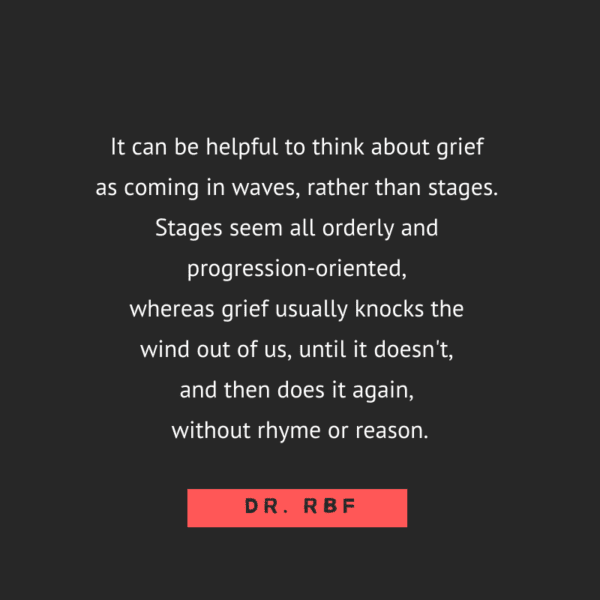
15 Dec Riding the Waves of Grief
I’m not good at grieving.
That is both a self statement, and a sentence I hear spoken often. The sentence itself is sort of meaningless because there isn’t a “good” way to grieve. There certainly isn’t one right way, nor does grief itself feel good. Grief is a difficult emotion, and one that we all have to wend our way though. It’s the hidden underbelly in a culture obsessed with happiness and positivity.
We know that we have a “right” to grieve the loss of a person close to us, or a pet perhaps, but the pandemic has forced us to acknowledge that there are many losses that happen without recognition. We have the loss of a job, or a business, maybe a regular social gathering, or community. Given that our everyday “normal” rushing leaves us little time to be aware of what we want, loss presents a threat to our sense of self and our sense of security. Now, more than ever it’s something we all face, on a personal as well, as a collective scale. As a globe, we’ve lost our sense of certainty.
So then, how do we grieve a feeling, or a sense of being in the world?
Grief requires attention. In regular life, rituals and routines offer us a way and a place to land. We have to turn inward to process our new reality. The sadness is important, forcing us to slow down and clarify what we need for a mental reset. Many cultures have rituals built around death that allow us to grieve and experience those feelings in a collective space. But of course, in the pandemic, many of those rituals have been changed or erased. When interrupted, as all our rituals have been during the pandemic, feelings of sadness may be present but not recognized as grief.
In my early 20s, I lived in the Balkans while working for an international aid organization. The woman who I was working and living with lost her father suddenly and tragically. In a time before cell phones, we had a shared landline which was intermittent at best. Dial-up internet worked occasionally, and only at the office. Our feelings of dislocation and isolation were intense and ongoing. And she was deeply grieving her beloved father. Much of what I learned about grief was from that year of living with her, sitting with her, and experiencing the rawness with her, separated from everything that felt normal and familiar.
I will never forget her telling me, “The worst part is every morning I have to wake up and remember again that he’s gone.”
Earlier in the pandemic, I woke each morning and a wave of sadness washed over me as I dragged my body out of bed to face the day. I knew I was exhausted. I wondered if I was depressed. Then I remembered the time with my friend, which allowed me to name my current experience as grief. I was grieving the people dying all over the globe, all the experiences left undone, the social connections going unmet, our normal routines canceled, the predictability of days sliding into one monotonous moment.
This realization enabled me to move through what felt like a life filled with molasses. The first step I knew in moving forward through anything hard: name the pain. We are in a communal moment of grief. We have to acknowledge what we feel, name it, and honor it. Once we do that, we can sit with the emotions and we can figure out how to survive even while experiencing the feeling. For me, that meant doubling down on recovery practices. I journaled, meditated, and used breath-practice to reconnect to my thoughts and my body.
Grief is hard and there is no one way to do it. It’s both a universal experience and profoundly personal. In addition to knowing the stages of grief, as named by Elizabeth Kubler-Ross, I think it’s helpful to think about the waves of grief. Stages seem all orderly and progression-oriented, whereas grief usually knocks the wind out of us, until it doesn’t, and then does it again without rhyme or reason.

Naming the pain and allowing ourselves to move through it helps keep denial at bay. Denying feelings of loss and denying the validity of our experiences risks turning pain into real suffering. Pain is unavoidable. It’s a mixture of biological and psychological sensations in response to harm. Suffering, however, is only psychological and, without acknowledgment, effects everything that we do.
Resiliency in the face of grief isn’t about doing or feeling anything in any particular order. Instead, it’s about recognizing our feelings, even as they are mixed in with other feelings. Resiliency requires self knowledge so we can utilize whatever self care strategies we have to move through the feelings to get to whatever comes next. Self awareness helps with resilience because, in essence, the brain is a predictive organ. And when grieving, our brains have to work overtime to calibrate our new experience to settle into our new normal: life without.
Grievers don’t like being told we will get over a feeling, because the feeling feels so intense, and is linked so closely with the person that we love. And yet, it’s important to recognize that we will feel differently, that every feeling has a beginning, a middle, and an end. We have to allow time for the anguish and sadness to run its course and to identify what is missing, but in the best case scenario, we will use that time and space to acknowledge the good as well as the bad and really think about what we want to take forward with us into the brave new world.




